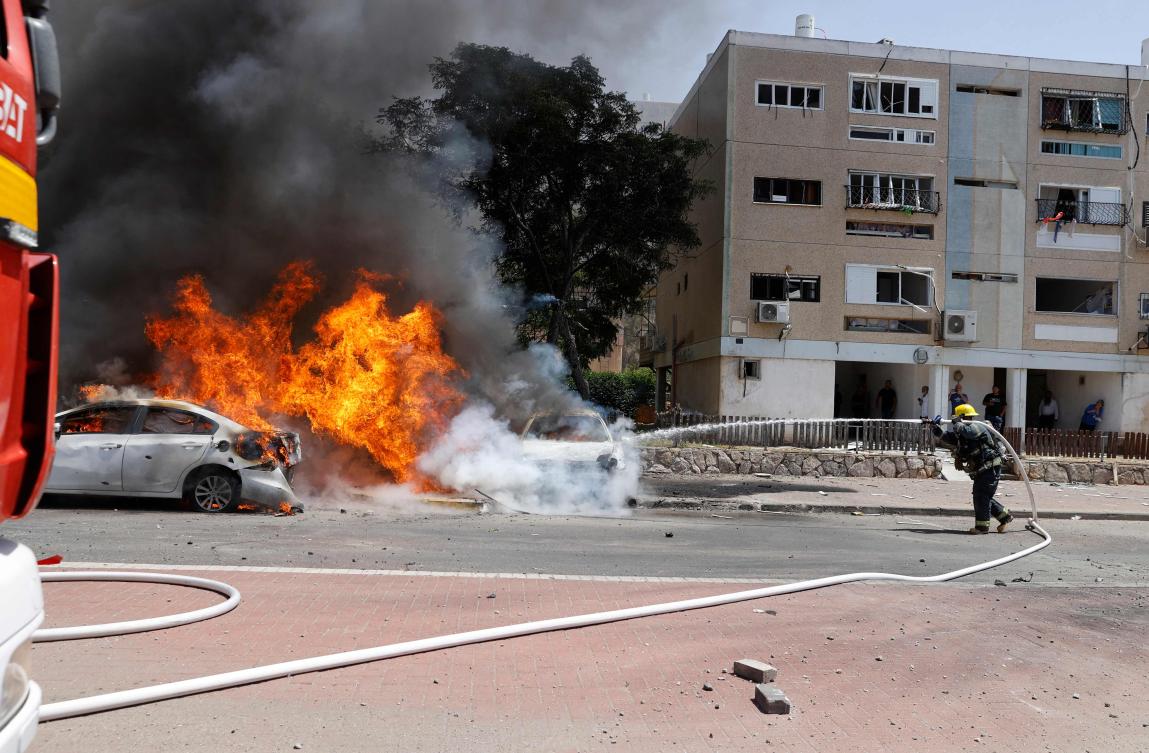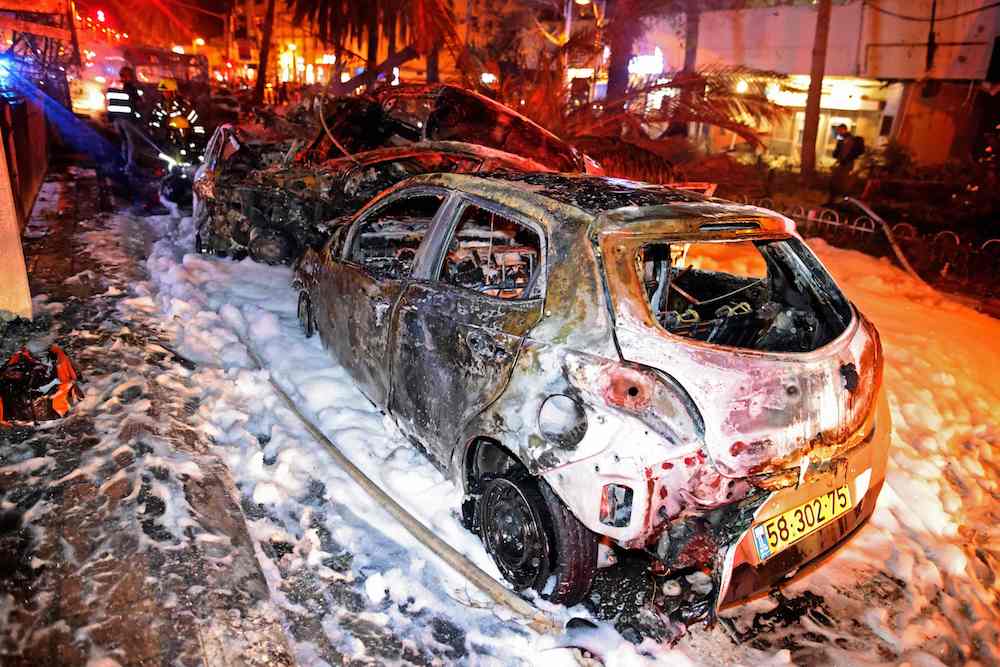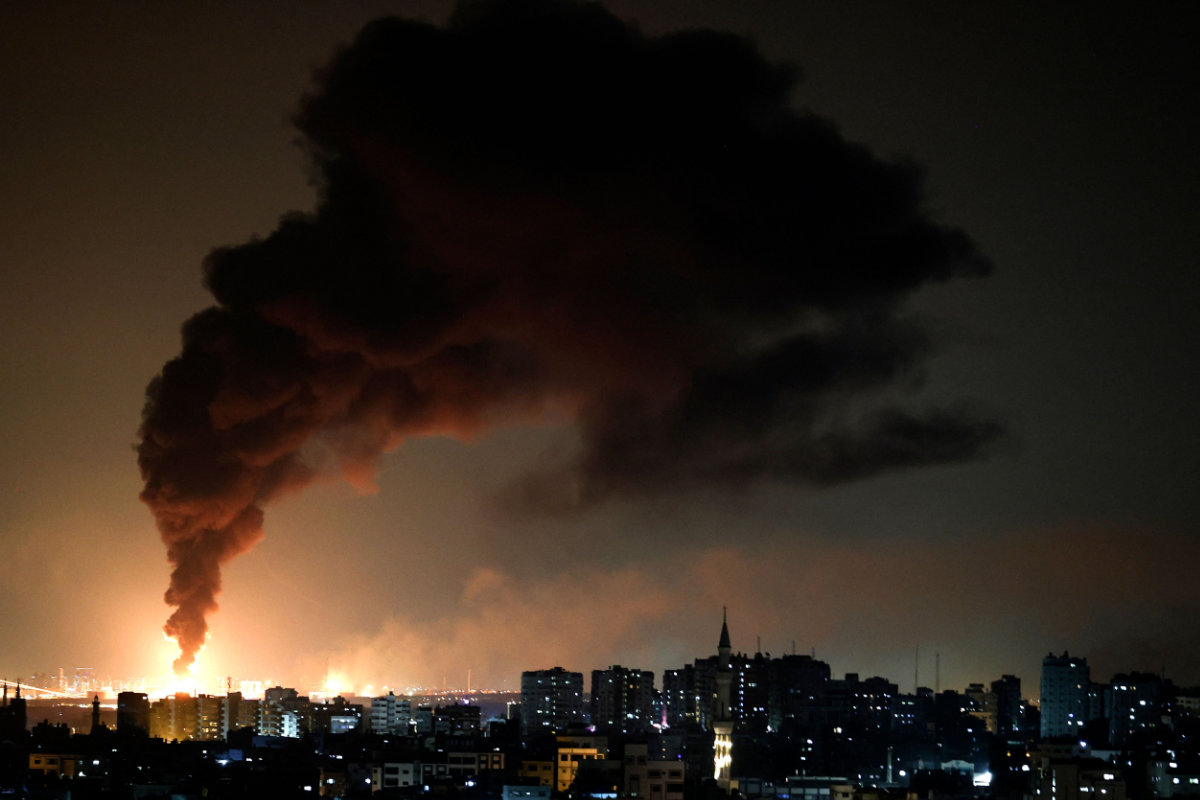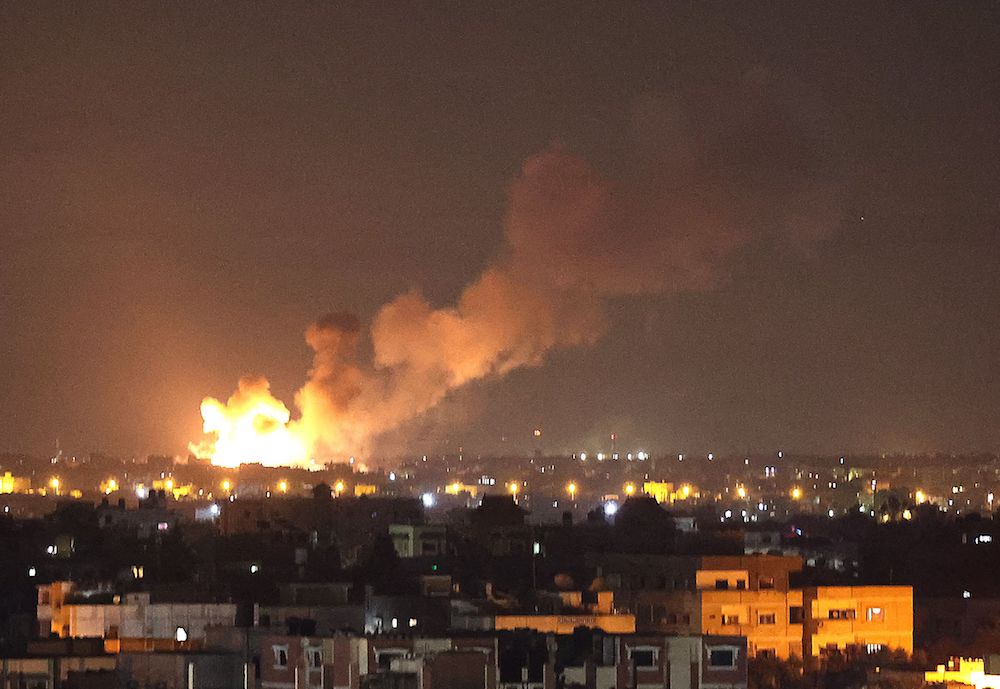GAZA CITY/JERUSALEM/CAIRO: Dozens of people died in relentless Israeli air strikes on the Gaza Strip and a rocket barrage by Hamas militants on Israeli targets on Tuesday and early Wednesday.
It was the heaviest fighting between the bitter enemies since 2014, and it showed no signs of slowing.
The death toll in Gaza rose to 35 Palestinians, including 10 children, according to the Health Ministry. Over 200 people were wounded.
Five Israelis, including three women and a child, were killed by rocket fire Tuesday and early Wednesday, and dozens of people wounded.
Israel stepped up its attacks Tuesday night, flattening a high-rise building used by the Hamas militant group and killing at least three militants in their hideouts as Palestinian rockets rained down almost nonstop on the southern Israeli town of Ashkelon.

Israeli firefighter extinguishes a burning vehicle on Tuesday after Hamas launched rockets from Gaza Strip to Ashkelon, at southern Israel. (AFP)
As the death toll mounted, Israel snubbed an offer by Egypt to broker an end to the violence.
“Egypt extensively reached out to Israel and other concerned countries urging them to exert all possible efforts to prevent the deterioration of the situation,” Egyptian Foreign Minister Sameh Shoukry said. “But we did not get the necessary response.” Instead, Israeli Prime Minister Benjamin Netanyahu vowed to rain more death on Gaza.
“Both the strength of the attacks and the frequency of the attacks will be increased,” he said, and military spokesman Lt. Col. Jonathan Conricus said Israel was increasing its forces on the Gaza border.
The US State Department urged restraint on both sides.
Arab League chief Ahmed Aboul Gheit said the attacks on Gaza were a “miserable show of force at the expense of children’s blood,” and “Israeli provocations” were an affront to Muslims on the eve of the Eid holiday.
The Organization of Islamic Cooperation, which held an emergency meeting in Jeddah, “praised the steadfastness of the Palestinian people in the occupied city of Jerusalem.”

Burnt vehicles are seen in the town of Holon near Tel Aviv after rockets were launched towards Israel from the Gaza Strip by Hamas. (AFP)
The conflict spread to Gaza after days of protests in occupied East Jerusalem, where hundreds of Palestinians — including worshippers praying in Al-Aqsa Mosque, Islam’s third-holiest site — were injured in a violent Israeli crackdown with stun grenades, tear gas and plastic bullets.
On Monday and Tuesday, Gazans endured a long night and day of bombardment and terror. Some lost their loved ones, others their homes.
Rashad Al-Sayed, 57, who lives on the sixth floor of the Tiba building in Al-Shati refugee camp, west of Gaza City, said the roof of the house collapsed on his family as they tried to sleep after dawn prayers.
From a bed in Gaza’s Al-Shifa Hospital, he told Arab News: “It was a harsh night, we could not sleep, and when we decided to sleep, the roof fell on us. Israeli warplanes struck an apartment above my flat on the seventh floor.”
Al-Sayed was slightly injured, but his eldest son, Ahmed, 23, was badly hurt and is in intensive care in the same hospital.

A huge column of smoke billows from an oil facility in the southern Israeli city of Ashkelon on May 11, 2021, after rockets were fired by the Palestinian Hamas movement. (AFP)
Witnesses told Arab News that Israeli warplanes fired four missiles at an apartment on the seventh floor of a tower block during dawn prayers at about 4:30 a.m., causing damage in most of the building, and killing a woman, her 19-year-old disabled son and another man on the floor below.
At midday, an air strike hit a building in the city center, sending terrified residents running into the street, including women and barefoot children. The Islamic Jihad militant group said the strike killed three of its commanders.
A 13-story residential block in the Gaza Strip collapsed on Tuesday night after being hit by an Israeli air strike. Three plumes of thick smoke rose from the tower, its upper stories still intact until it collapsed to the ground. The tower housed an office used by the Hamas political leadership.
The Gaza Health Ministry said 28 people, including 10 children and the woman, had been killed and 152 injured since Monday. Ministry spokesman Ashraf Al-Kidra said Israel’s “relentless assault” was overwhelming the healthcare system, which has been struggling with COVID-19.
Electricity in the surrounding area went out, and residents were using flashlights.

Flames are seen following an Israeli air strike on Rafah, in the south of the Gaza Strip controlled by the Palestinian Hamas movement, on May 11, 2021. (AFP)
Shortly after the attack, Hamas and the Islamic Jihad group said they would respond by firing rockets at Tel Aviv.
Air raid sirens and explosions were heard around the city, and the skies were lit up by the streaks of multiple interceptor missiles launched toward the incoming rockets.
Pedestrians ran for shelter, and diners streamed out of Tel Aviv restaurants while others flattened themselves on pavements as the sirens sounded.
Israeli television stations said three people had been wounded in the suburb of Holon.
The Israel Airports Authority said it had halted take-offs at Tel Aviv’s Ben Gurion airport “to allow defense of (the) nation’s skies.”
“We are now carrying out our promise,” Hamas’s armed wing said in a statement. “The Qassam Brigades are launching their biggest rocket strike against Tel Aviv and its suburbs, with 130 rockets, in response to the enemy’s targeting of residential towers.”
Hours earlier, Israel had sent 80 jets to bomb Gaza and massed tanks on the border as rocket barrages hit Israeli towns for a second day, deepening a conflict in which at least 28 people in the Palestinian enclave and two in Israel have been killed.
Residents of the block and people living nearby had been warned to evacuate the area around an hour before the air strike, according to witnesses, and there were no reports of casualties two hours after it collapsed.
The most serious outbreak of fighting since 2019 between Israel and armed factions in Gaza was triggered by clashes between Palestinians and Israeli police at Jerusalem’s Al-Aqsa Mosque on Monday.
Opinion
This section contains relevant reference points, placed in (Opinion field)
The city, holy to Jews, Muslims and Christians, has been tense during the Muslim fasting month of Ramadan, with the threat of a court ruling evicting Palestinians from homes claimed by Jewish settlers adding to the friction.
Prime Minister Benjamin Netanyahu said Israel would step up its strikes on Gaza, an enclave of 2 million people, in response to the rocket attacks.
“Both the strength of the attacks and the frequency of the attacks will be increased,” he said in a video statement.
Within an hour, Israel said it had deployed jets to bomb rocket launch sites in and around Gaza City.Officials said infantry and armor were being dispatched to reinforce the tanks already gathered on the border, evoking memories of the last Israeli ground incursion into Gaza to stop rocket attacks, in 2014.
More than 2,100 Gazans were killed in the seven-week war that followed, according to the Gaza health ministry, along with 73 Israelis, and thousands of homes in Gaza were razed.
On Tuesday, before the block collapsed, the Gaza health ministry said at least 28 Palestinians, including 10 children, had been killed and 152 wounded by Israeli strikes since Hamas on Monday fired rockets toward Jerusalem for the first time since 2014.
Israel’s national ambulance service said two women had been killed in rocket strikes on the southern city of Ashkelon.
The International Committee of the Red Cross urged all sides to step back, and reminded them of the requirement in international law to try to avoid civilian casualties.
(With AP, Reuters)





































